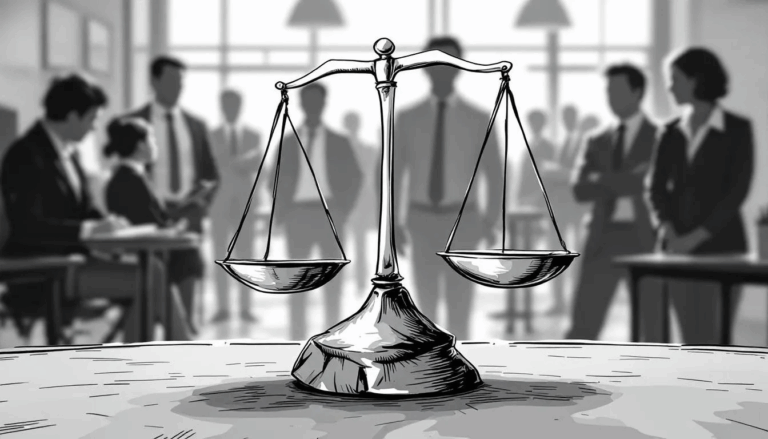Top EEOC Lawyer Strategies for Successful Workplace Discrimination Claims
If you’re grappling with workplace discrimination, an EEOC lawyer is your ally in seeking justice. Discover their pivotal role in filing claims, enforcing rights, and securing fair settlements. This article outlines the critical support they provide, from assessing your case to potentially filing a lawsuit.
Key Takeaways
- EEOC lawyers play a crucial role in workplace discrimination claims by guiding clients through federal employment laws and providing representation during the complaint process.
- Knowledge of federal anti-discrimination laws like Title VII, the ADA, ADEA, and the Rehabilitation Act is essential to protect employees and requires expert navigation by experienced employment lawyers.
- Filing an EEOC complaint involves multiple steps, from initial consultations and drafting the complaint to mediation or litigation, with protection against retaliation and seeking various remedies for discrimination.
Understanding the Role of an EEOC Lawyer
At the heart of any successful workplace discrimination claim lies the indispensable role of employment lawyers. These attorneys are the guiding light, helping clients navigate the labyrinth of federal employment law and understand the EEOC’s role in enforcing federal anti-discrimination laws. From conducting thorough case evaluations to gathering evidence and negotiating fair settlements, the expertise of an employment law attorney is pivotal.
But the job doesn’t end there! The EEOC attorney is also responsible for:
- Ensuring no critical filing dates are missed
- Ensuring that no rights are inadvertently waived during the EEOC complaint process
- Offering representation during interviews and conciliation
- Filing lawsuits in cases where a satisfactory resolution is not reached
- Assisting in obtaining a Right to Sue letter if the EEOC investigation outcome isn’t favorable, enabling litigation.
Navigating Federal Anti-Discrimination Laws
When it comes to federal anti-discrimination laws, knowledge is power. For instance, Title VII of the Civil Rights Act of 1964 is a significant piece of federal law, protecting employees from discrimination based on:
- race
- color
- religion
- sex
- national origin
It is essential to be aware of both federal and state laws to ensure compliance and protect employees from discrimination.
Then we have the ADA, which broadens the definition of disability to offer wider protections and requires employers to provide reasonable accommodations.
But, it doesn’t stop there. The ADEA shields individuals aged 40 and above from employment discrimination, while the Rehabilitation Act of 1973 safeguards federal employees from disability discrimination. As you can see, navigating these laws can be a complex task, but with the guidance of an experienced employment lawyer, you can rest assured that you’re protected from workplace discrimination.
The EEOC Complaint Filing Process
Filing an EEOC complaint is a process that requires diligence and precision. From consulting with an experienced EEOC lawyer to adhering to strict deadlines, every step is crucial in ensuring your rights are protected.
Initial Consultation with an Employment Lawyer
The journey begins with a consultation. Here, the attorney listens to your story, asks questions to understand the case, and explains the importance of providing both positive and negative aspects of your claim. This is the time when you need to bring any relevant evidence such as text messages, emails, or other documentation and be prepared to discuss the key events and timeline related to your discrimination claim.
Honesty is the best policy, especially in these discussions. Being upfront about the facts of the case allows the attorney to effectively assess any potential legal claims to pursue. After the consultation, the attorney will advise on the viability of a potential legal claim and discuss their availability to represent you, including the fee structure for their services.
Drafting and Submitting Your Formal Complaint
Once the ground is set, the next step is drafting and submitting your formal complaint. It should include:
- Your name, address, and telephone number
- A brief description of the discriminatory events
- The type of discrimination, whether it’s based on race, color, religion, sex, national origin, age, disability, genetic information, or retaliation
But there’s more to it. The complaint should also detail any injuries suffered as a result of the alleged discrimination. Before you submit it, ensure it has a signature from either you or your lawyer.
Representation Through Mediation or Litigation
The ultimate goal of EEOC mediation is to facilitate a discussion between the parties to reach an agreement. It’s not just about fact-finding but also understanding the breakdown of the employment relationship and exploring potential means of repairing it, especially if employment is ongoing.
However, if the complaint proceeds and a satisfactory resolution is not reached, a lawsuit can be filed at various stages throughout the EEOC complaint process. An EEOC Administrative Judge can conduct a hearing, render a decision, and order relief if they find that discrimination occurred.
The agency may propose a settlement during the complaint process, which, if agreed upon by the complainant, leads to the dismissal of the complaint without further action.
Protecting Against Retaliation
Retaliation is a tricky beast. But federal law shields employees from retaliation when they engage in ‘protected activity’ such as filing discrimination complaints or serving as witnesses in EEO cases. Retaliation can manifest in various forms like demotion, harassment, or penalization related to personnel records, promotion processes, and privileges at the workplace.
Here’s where an EEOC lawyer steps in. They can:
- Identify and substantiate retaliation claims
- Defend against unlawful retaliation in sexual harassment cases
- Navigate the complexities of retaliation allegations in federal EEOC claims
- Provide thorough analysis and expert legal support, especially when dealing with psychological and behavioral factors affecting managers.
Seeking Remedies for Discrimination
So, you’ve been a victim of workplace discrimination and wrongful termination. What’s next? Well, you’re entitled to monetary remedies such as back pay, front pay, compensatory damages for emotional pain, and other forms of equitable relief. But it’s not all about the money. There are also non-monetary equitable reliefs available, such as the cancellation of unwarranted personnel actions or adverse materials from records, and providing opportunities for benefits denied due to discrimination like training.
In retaliation cases, EEOC attorneys may seek damages including:
- Lost wages
- Benefits
- Compensatory damages for emotional distress
- Punitive damages to deter the employer from future violations
The prevailing complainant in a discrimination case can often recover attorney’s fees and costs, which may include fees for expert and non-lawyer services.
Federal employees who win discrimination claims may be eligible for specific remedies, including:
- Reinstatement
- Classification adjustments
- Changes in work duties or location
- Compensation for career harm
- Coverage of attorney’s fees
Legal Support for Special Cases
Every case is unique, and some can be quite special. That’s where the expertise of EEOC lawyers comes to the fore. They support victims of hostile work environments by demonstrating that the harassment was unwelcome, based on a protected class, severe or pervasive, and unreasonably interfered with work performance. In cases of sexual harassment, EEOC lawyers assist victims by understanding the difference between Quid Pro Quo and Hostile Work Environment claims, evaluating the emotional distress caused, and providing representation in legal filings and proceedings.
EEOC lawyers can also seek punitive damages in intentional workplace harassment cases, which are considered unlawful employment practices, to punish the employer and deter future misconduct. They establish employer liability under vicarious liability doctrine for harassment committed by supervisors or coworkers, ensuring that employers are held accountable.
Choosing the Right Nashville Employment Lawyer
Choosing the right Nashville employment lawyer is a crucial step in your journey. Successful Nashville employment attorneys often have:
- A strong track record of advocating for employee rights
- Firms that share testimonials or case studies provide insights into their effectiveness and capabilities
- Proficiency in both federal and Tennessee-specific laws, such as the Tennessee Human Rights Act and Tennessee Disability Act, which are crucial for employee rights protection. An experienced employment attorney will have the knowledge and expertise to navigate these complex laws effectively.
But it’s not just about the track record and proficiency. It’s also about communication. Selecting a Nashville employment law firm committed to clear communication is essential, fostering a trustful attorney-client relationship that is key to managing employment law cases.
Collaborative Approach to Employment Law Firm Services
In the world of law, collaboration is key. Collaborative law firms are five times more likely to perform highly compared to those that don’t promote teamwork. A collaborative approach allows law firms to attract new clients by showcasing their teamwork capabilities as part of their unique selling point.
Creating a collaborative culture within a law firm is linked to higher levels of employee happiness, productivity, engagement, and lower fatigue. Collaborative law firms can expand their services to include complex, labor-intensive cases by leveraging project management platforms and document sharing tools. Client satisfaction and faster case turnaround are positively impacted by collaborative working, as it facilitates team-based problem-solving and efficient progression of matters.
Recruitment is enhanced by a collaborative environment, as it attracts candidates seeking supportive culture, training, and the use of intuitive technologies that facilitate task management.
Crafting Strong Severance Agreements
When it comes to severance agreements, an EEOC lawyer can be your best ally. They can:
- Advise employees on the legal rights they may be relinquishing in a severance agreement and ensure that any release or waiver of rights is made knowingly and voluntarily.
- Negotiate terms in severance agreements that reflect fair compensation relative to the rights waived.
- Assess additional factors like tenure, position, company size, and the presence of non-compete clauses.
Having an EEOC lawyer on your side can help protect your rights and ensure a fair severance agreement.
Moreover, EEOC attorneys ensure severance agreements are clearly written, delineating specific statutes and rights affected and clarifying complex provisions to avoid future legal disputes. Involvement of an EEOC lawyer in severance negotiations can minimize the risks inherent in self-negotiation and offer peace of mind that the employee is receiving a fair and just settlement.
Summary
In the complex world of employment law, understanding your rights and the EEOC process is vital. From filing a complaint to seeking remedies for discrimination, the guidance and representation of an experienced EEOC lawyer can be pivotal. Whether it’s navigating federal anti-discrimination laws, protecting against retaliation, or crafting strong severance agreements, an attorney’s expertise can make all the difference. So, take your time, do your research, and always remember – you have rights, and there are professionals ready to help you uphold them.



